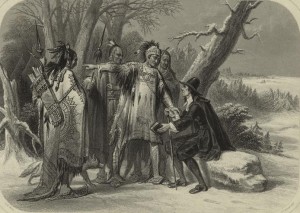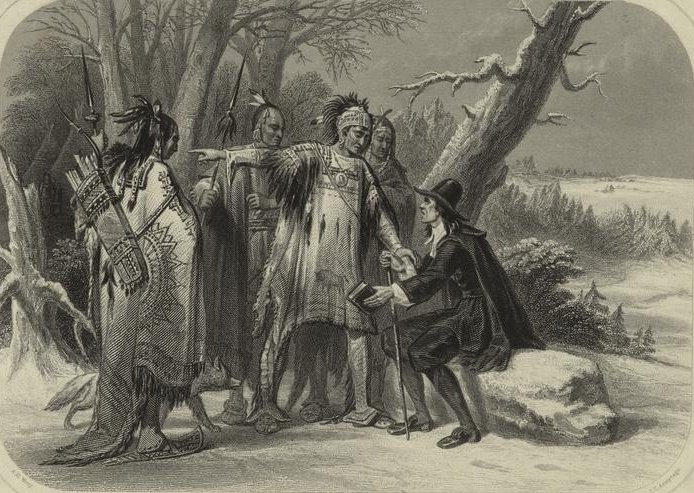 By Karen Scott, Esq.
By Karen Scott, Esq.
[dc]L[/dc]iberty of conscience is the foundation of human rights and social justice. It alone pertains to the relationship between God and human beings, protecting the beliefs and practices that facilitate that primary relationship. This makes liberty of conscience a matter of universal importance.
Some theorists assert not everyone’s conscience should be safeguarded. John Locke was one of these, holding that Catholics’ and atheists’ consciences were unworthy of protection.[1] Similarly, the Puritans coming to North America for religious freedom denied it to those whose opinions and worship differed from their own.[2]
Even today there are people who do not agree with ?liberty of conscience,’ but only with ?religious liberty.’ R. R. Reno, editor of First Things, asserts that liberals and Nones, seeking to ‘replace religious liberty with a plenary ?liberty of conscience’ . . . seems to expand freedom, but that’s an illusion.’[3]
Roger Williams, a devout Puritan, was banished from Massachusetts Bay Colony due to his religious convictions. He believed everyone’s conscience worthy of protection, even Catholics and atheists.[4] He believed God reaches every human being through the conscience. Therefore, ?religious compulsion is pointless, because belief is a phenomenon subject to God’s grace, power and timetable alone. Only God can instill true belief in a human mind and heart . . .‘.[5] As nothing should come between God and the individual heart, protecting liberty of conscience was vital in Williams’ opinion and he wrote pages on the subject, The Bloudy Tenet of Persecution, for Cause of Conscience (1644) being his most quoted work.
In a 1792 essay, James Madison wrote, ?government is instituted to protect property of every sort’ and then noted ?conscience is the most sacred of property.’[6] In Memorial and Remonstrance, written in opposition to a bill assessing taxes to support religion, Madison noted that ?it is an offence against God’ not to recognize ?free exercise of Religion according to dictates of Conscience’ even for ?those whose minds have not yet yielded to the evidence which has convinced us.’[7] Governments are to protect everyone’s conscience, believer and unbeliever.
The universal protection of conscience elevates the honor and dignity of every human being. One cannot protect the conscience of others, particularly those one opposes, without recognizing that each person is a member of the human race. Christians especially should be on the forefront of protecting everyone’s conscience because we recognize God as the Creator of humanity, creating us in His image. Therefore, we need to recognize every person is created in God’s image, even those with whom we disagree.
Just as we cannot see where the wind comes from or where it goes, we cannot tell when the Holy Spirit is working on a person’s heart or how far God has wooed them (John 3:8). Each person is to come to their own conclusions and choices (Joshua 24:15) and be persuaded in their own mind (Romans 14:5).
Conflict between competing consciences is probably greater and more fiercely fought than in other fields of social justice. For example, while some consciences hold that employers must accommodate the religious needs of their employees when employees need time off work for worship, others do not. Some consciences have no problem bearing arms or owning a gun for personal protection. Other consciences abhor violence. Some consciences permit contraception. Others do not. While some consciences allow abortion, others shrink from it. Some consciences approve same-sex marriage while other consciences forbid it. These fierce conflicts between competing beliefs of conscience should not be surprising because conscience deals with the essence of each person’s core identity, the life they choose to live, and their very personal understanding of God.
Protecting conscience requires sensitivity, understanding and often courage. While many working in the area of liberty of conscience have no religious affiliation, Christians should be especially equipped to work in this field remembering that each of us is created in God’s image and that God wants each individual to follow Him as a response to His love and not because of any force, threat or unduly restrictive law.
___________________________
Karen Scott, Esq. an alumnus of Walla Walla University, successfully argued before the Supreme Court of Canada that her client, a Seventh-day Adventist, not be required to work on Sabbath to retain his job, setting a national precedent for accommodation of religious belief and practice in the workplace. She recently completed a Master of Studies in International Human Rights Law at Oxford University. Her dissertation focused on protecting religious belief and practice in the workplace and international human rights law. She is President of Center for Liberty of Conscience (centerforliberty.org).
[box] The Center for Liberty of Conscience produced and distributes the documentary, “Roger Williams: Freedom’s Forgotten Hero.” A trailer and ordering information is available here: http://centerforliberty.org/documentary/ Participating scholars include Edwin S. Gaustad, Professor Emeritus at the University of California Riverside; Derek H. Davis, Director of Church State Studies at Baylor University; Keith Francis, Chair of the History Dept. at Pacific Union College; and J. Stanley Lemons, Professor of History at Rhode Island College.

[/box]
[1] Locke, John. A Letter Concerning Toleration [1689] <http://www.constitution.org/jl/tolerati.htm> accessed April 30, 2013.
[2] White, Ellen G. The Great Controversy. Mountain View, CA: Pacific Press Publishing Association 1950, pp. 292-293.
[3] Reno, R. R., Religion and Public Life in America <http://www.hillsdale.edu/news/imprimis/archive/issue.asp?year=2013&month=04> accessed April 30, 2013.
[4] Barry, John M. Roger Williams and the Creation of the American Soul: Church, State and the Birth of Liberty. Viking/Penguin/Div. Of Penguin Putnam (January 10, 2012), p. 392.
[5] Davis, James Calvin. The Moral Theology of Roger Williams: Christian Conviction and Public Ethics. Louisville, KY: Westminster John Knox Press, 2004, p. 20.
[6] Madison, James. Property, Chapter 16, Document 23, 29 Mar. 1792 Papers 14:266–68 <http://press-pubs.uchicago.edu/founders/documents/v1ch16s23.html> accessed April 30, 2013.
[7] Madison, James. Memorial and Remonstrance Against Religious Assessments [1785] <http://religiousfreedom.lib.virginia.edu/sacred/madison_m&r_1785.html> accessed April 30, 2013.
